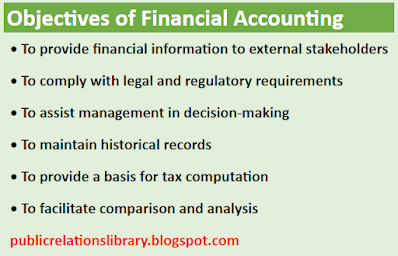Financial accounting is a
branch of accounting that deals with the preparation of financial statements
and reports to provide information to various stakeholders. The main objective
of financial accounting is to provide accurate and reliable information about
an organization's financial position, performance, and cash flow.

- To provide financial information to external
stakeholders: Financial accounting provides financial information to
external stakeholders such as investors, lenders, regulators, and the
general public. This information helps them in decision-making and assessing
the organization's financial performance.
- To comply with legal and regulatory
requirements: Financial accounting is governed by various laws and
regulations that organizations must comply with. The objective of
financial accounting is to provide information that complies with these
laws and regulations.
- To assist management in decision-making:
Financial accounting provides information to management that can be used
for planning and control purposes. Management can use this information to
make informed decisions about the future direction of the organization.
- To maintain historical records: Financial
accounting provides a historical record of an organization's financial
transactions. This information can be used to identify trends, patterns,
and opportunities for improvement.
- To provide a basis for tax computation:
Financial accounting provides information that is used to calculate an
organization's tax liability. This information is used by tax authorities
to determine the amount of tax owed by the organization.
- To facilitate comparison and analysis:
Financial accounting provides information that can be used for comparison
and analysis purposes. This information can be used to compare an
organization's financial performance with that of its competitors, industry
peers, and over time.
In conclusion, the
objectives of financial accounting are to provide accurate and reliable
financial information, comply with legal and regulatory requirements, assist
management in decision-making, maintain historical records, provide a basis for
tax computation, and facilitate comparison and analysis.